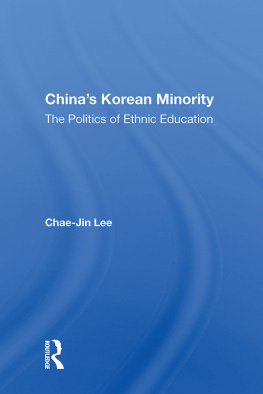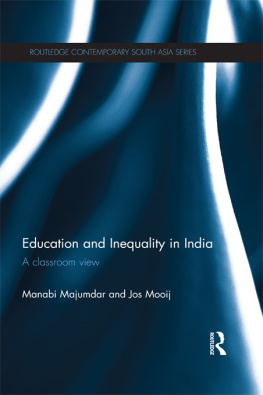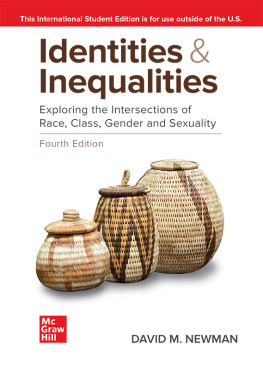
Social and Ethnic Inequalities in the Cypriot Education System
Accommodating the diversity of learners in mainstream schooling and providing high quality education for all, inclusive education is prioritised at international and European levels as a human rights issue and as a reform strategy which tackles inequalities and promotes social cohesion within both schools and wider society. This book advances critical realist ideas in empirical research in order to close the theorypractice gap and shift the emphasis from epistemology to ontology with regard to teachers empowerment to provide inclusive education. With a focus on the school context rather than the agency of the individual teacher, the authors use empirical data from case studies to demonstrate teachers disempowerment as real, and rooted in features of reality. Offering a unified critical realist model, the book challenges taken-for-granted ideas and practices concerning the empowerment of teachers in inclusive education and seeks to set the ground for a more holistic and inclusive educational change.
Areti Stylianou is a curriculum development officer, working at the Pedagogical Institute of Cyprus. She has published articles in a number of journals, including the International Journal of Inclusive Education and British Journal of Educational Studies.
David Scott is Emeritus Professor of Curriculum, Pedagogy and Assessment at the Institute of Education, University College London. He is co-author of Equalities and Inequalities in the English Education System (2018).
Routledge Studies in Critical Realism
Critical Realism is a broad movement within philosophy and social science. It is a movement that began in British philosophy and sociology following the founding work of Roy Bhaskar, Margaret Archer and others. Critical Realism emerged from the desire to realise an adequate realist philosophy of science, social science, and of critique. Against empiricism, positivism and various idealisms (interpretivism, radical social constructionism), Critical Realism argues for the necessity of ontology. The pursuit of ontology is the attempt to understand and say something about the things themselves and not simply about our beliefs, experiences, or our current knowledge and understanding of those things. Critical Realism also argues against the implicit ontology of the empiricists and idealists of events and regularities, reducing reality to thought, language, belief, custom, or experience. Instead Critical Realism advocates a structural realist and causal powers approach to natural and social ontology, with a focus upon social relations and process of social transformation.
Important movements within Critical Realism include the morphogenetic approach developed by Margaret Archer; Critical Realist economics developed by Tony Lawson; as well as dialectical Critical Realism (embracing being, becoming and absence) and the philosophy of metaReality (emphasising priority of the non-dual) developed by Roy Bhaskar.
For over thirty years, Routledge has been closely associated with Critical Realism and, in particular, the work of Roy Bhaskar, publishing well over fifty works in, or informed by, Critical Realism (in series including Critical Realism: Interventions; Ontological Explorations; New Studies in Critical Realism and Education). These have all now been brought together under one series dedicated to Critical Realism.
The Centre for Critical Realism is the advisory editorial board for the series. If you would like to know more about the Centre for Critical Realism, or to submit a book proposal, please visit www.centreforcriticalrealism.com.
Explaining Society
Critical Realism in the Social Sciences
Berth Danermark, Mats Ekstrm and Jan Ch. Karlsson
Social and Ethnic Inequalities in the Cypriot Education System
A Critical Realist View on Empowerment
Areti Stylianou and David Scott
For more information about this series, please visit: https://www.routledge.com/Routledge-Studies-in-Critical-Realism/book-series/SE0518
First published 2019
by Routledge
2 Park Square, Milton Park, Abingdon, Oxon OX14 4RN
and by Routledge
52 Vanderbilt Avenue, New York, NY 10017
Routledge is an imprint of the Taylor & Francis Group, an informa business
2019 Areti Stylianou and David Scott
The right of Areti Stylianou and David Scott to be identified as authors of this work has been asserted by them in accordance with sections 77 and 78 of the Copyright, Designs and Patents Act 1988.
All rights reserved. No part of this book may be reprinted or reproduced or utilised in any form or by any electronic, mechanical, or other means, now known or hereafter invented, including photocopying and recording, or in any information storage or retrieval system, without permission in writing from the publishers.
Trademark notice: Product or corporate names may be trademarks or registered trademarks, and are used only for identification and explanation without intent to infringe.
British Library Cataloguing in Publication Data
A catalogue record for this book is available from the British Library
Library of Congress Cataloging-in-Publication Data
Names: Stylianou, Areti, 1981- author. | Scott, David, 1951- author.
Title: Social and ethnic inequalities in the Cypriot education system : a critical realist view on empowerment / Areti Stylianou and David Scott.
Description: Abingdon, Oxon ; New York, NY : Routledge, 2019. | Series: Routledge studies in critical realism | Includes bibliographical references and index.
Identifiers: LCCN 2019004497 (print) | LCCN 2019020361 (ebook) | ISBN 9780203730195 (ebk) | ISBN 9781351397179 (web pdf) | ISBN 9781351397162 ( epub) | ISBN 9781351397155 (mobi/kindle) | ISBN 9781138304390 (hbk)
Subjects: LCSH: Education--Social aspects--Cyprus. | Educational change--Cyprus. | Educational equalization--Cyprus. | Critical realism.
Classification: LCC LC213.3.C93 (ebook) | LCC LC213.3.C93 S89 2019 (print) | DDC 370.95693--dc23
LC record available at https://lccn.loc.gov/2019004497
ISBN: 978-1-138-30439-0 (hbk)
ISBN: 978-0-203-73019-5 (ebk)
To my twin babies Savvas and Eftychia, with gratitude and love for coming into our lives, making every moment brighter; having you is a blessing and, to my husband Elpidoforos for being a wonderful partner and a great father.
(Areti)
A huge and sincere thank you goes to all the people who helped in the production of this book. I, Areti, express gratitude to all those teachers, head teachers and children who opened up and shared their feelings, thinking and emotions and to the parents who gave permission to observe and interview their children. These data were an invaluable source for understanding the phenomenon of teachers empowerment.
From the academic community I want to express thanks to Roy Bhaskar. I had the chance to be supervised by this great world scholar and draw on his ground-breaking theories. Also, special thanks to Professor Michalinos Zembylas, whose kindness, constant support and fruitful comments, especially concerning the empirical part of this work have been crucial. David Scott has offered me his professional experience and interdisciplinary expertise along with his personal understanding in the last phase of my PhD. His help in writing this book was










